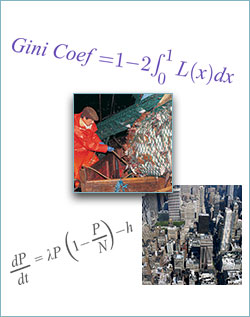

Resources
2013 MAM Homepage
Announcement
Theme Essays
Theme Poster
MAM 2013 Blog
Committee
Sample Press Release
Educational and Related Resources
Linking Icons
Activities Sustainability Counts Initiative Speakers Bureau General Information Social Media |
Mathematics Awareness Month - April 2013
|
||||||||||||||||||||||
Learn more about the interconnected nature of these resources |
||||||||||
 |
 |
 |
 |
 |
 |
 |
 |
 |
 |
 |
 Worldwide, fish stocks provide millions of people with necessary food. We have seen some fish stocks crash due to over-fishing or poorly handled international treaties.
Imposing new restrictions or fishing regulations is often controversial, because those changes impact the livelihood of those that depend on fishing for a living. And yet, if we overharvest the fisheries today, there will be no fish available to feed future generations and no jobs for the fishing industry of tomorrow. Resource management professionals use mathematical models, building on the logistic equation, to determine how best to manage renewable resources like fish, and possibly restore some of the world’s fisheries.
Worldwide, fish stocks provide millions of people with necessary food. We have seen some fish stocks crash due to over-fishing or poorly handled international treaties.
Imposing new restrictions or fishing regulations is often controversial, because those changes impact the livelihood of those that depend on fishing for a living. And yet, if we overharvest the fisheries today, there will be no fish available to feed future generations and no jobs for the fishing industry of tomorrow. Resource management professionals use mathematical models, building on the logistic equation, to determine how best to manage renewable resources like fish, and possibly restore some of the world’s fisheries.
Mathematics Awareness Month is sponsored each year by the Joint Policy Board for Mathematics to recognize the importance of mathematics through written materials and an accompanying poster that highlight mathematical developments and applications in a particular area. |